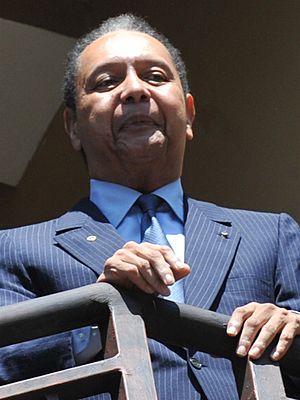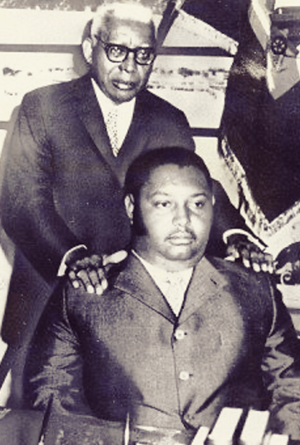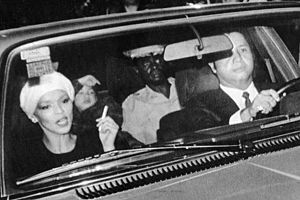Jean-Claude Duvalier facts for kids
Quick facts for kids
Jean-Claude Duvalier
|
|
|---|---|

Duvalier in 2011
|
|
| 35th President of Haiti | |
| In office 22 April 1971 – 7 February 1986 |
|
| Preceded by | François Duvalier |
| Succeeded by | Henri Namphy |
| Personal details | |
| Born | 3 July 1951 Port-au-Prince, Haiti |
| Died | 4 October 2014 (aged 63) Port-au-Prince, Haiti |
| Political party | PUN |
| Spouse |
Michèle Bennett
(m. 1980; div. 1990) |
| Children | Anya Duvalier, Nicolas Duvalier |
| Parents |
|
| Alma mater | University of Haiti |
| Nickname | Baby Doc |
Jean-Claude Duvalier (born 3 July 1951, died 4 October 2014), often called "Baby Doc", was a leader of Haiti. He was the President of Haiti from 1971 until 1986. He took over after his father, François "Papa Doc" Duvalier, passed away in 1971.
When he became president, Jean-Claude Duvalier was only 19 years old, making him the youngest president in the world at that time. During his time in power, many Haitians faced difficult times. He lived a very expensive life, including a US$2 million wedding in 1980. Meanwhile, Haiti remained one of the poorest countries in the Western Hemisphere.
Relations between Haiti and the United States changed over time. They improved when Duvalier first became president. Later, they became strained under President Jimmy Carter but got better again under President Ronald Reagan. This was because the Duvaliers were strongly against communism.
In 1985, people in Haiti began to protest against Duvalier's rule. He left Haiti for France in February 1986 on a U.S. Air Force plane. After living in France for 25 years, Duvalier unexpectedly returned to Haiti in 2011. He was arrested and faced charges related to corruption. He died of a heart attack in 2014 when he was 63 years old.
Contents
Early Life of Jean-Claude Duvalier
Jean-Claude Duvalier was born in Port-au-Prince, Haiti. His mother was Simone Ovide and his father was François Duvalier. His father was a powerful leader who became the dictator of Haiti.
Jean-Claude grew up in a very private home. He went to Nouveau College Bird and Institution Saint-Louis de Gonzague for school. Later, he studied law at the University of Haiti.
Duvalier Becomes President
In April 1971, Jean-Claude Duvalier became the president of Haiti. He was only 19 years old when his father, "Papa Doc" Duvalier, died. This made him the youngest president in the world at that time.
At first, Jean-Claude Duvalier wasn't very interested in leading the country. He would have preferred his older sister, Marie-Denise Duvalier, to be president. He let his mother, Simone Ovide Duvalier, and other advisors handle most of the important government tasks. He often spent his time attending official events and enjoying a lavish lifestyle.
Changes and Challenges in Haiti
Duvalier was given total power by Haiti's constitution. He made some small changes to the government. For example, he released a few political prisoners and made it a bit easier for the press to report news. However, the main way the government worked didn't really change. People were not allowed to speak out against the government, and the country's law-making body simply approved whatever the president wanted.
Much of the Duvalier family's money came from something called the Régie du Tabac. This was a special government account that started as a tobacco business. Over time, it grew to include money from other government businesses. This account was used as a secret fund, and no one ever saw how the money was spent.
Because Duvalier didn't pay much attention to governing, many important decisions were made by a small group of his father's old friends. These people were sometimes called the "dinosaurs." Other countries, including the United States, were more willing to give Haiti money and didn't check as closely on human rights issues during this time.
Duvalier's Marriage
On May 27, 1980, Duvalier married Michèle Bennett. Their wedding was very expensive, costing about US$2 million. Some people in Haiti criticized how much money was spent on the wedding. However, others thought it was a grand event.
After the marriage, some people in the business community and wealthy families became unhappy. They saw more corruption involving the Duvaliers and Michèle's family. The government also became stricter, which made the situation even more tense. Michèle became very powerful herself. She would sometimes scold government ministers during meetings while her husband was resting. Jean-Claude and Michèle had two children, François Nicolas and Anya.
Growing Unrest in Haiti
In 1978, a disease called African swine fever spread among pigs in Haiti. To stop the disease, U.S. authorities insisted that all of Haiti's pigs be removed in 1982. This program caused a lot of economic hardship for farmers, who raised pigs as a way to save money.
Also, in the early 1980s, reports about HIV/AIDS in Haiti caused tourism to drop a lot. By the mid-1980s, many Haitians felt hopeless as the economy got worse and more people faced hunger.
In March 1983, Pope John Paul II visited Haiti. He said that "things must change in Haiti." He asked those in power to help their fellow citizens. This message inspired many people and led to more protests and social action.
A revolt began in different parts of Haiti in 1985. The city of Gonaïves was the first to have street protests. People also raided food warehouses. From October 1985 to January 1986, the protests spread to other cities. By the end of January, people in the south of Haiti also revolted.
Duvalier tried to stop the protests by lowering food prices by 10 percent. He also closed independent radio stations and changed some of his government officials. Police and army units tried to control the crowds. However, these actions did not stop the growing protests against his rule. His wife and advisors wanted him to stay in power and urged him to stop the rebellion.
Duvalier Leaves Haiti
In January 1986, the U.S. government, led by President Ronald Reagan, began to pressure Duvalier to give up his power and leave Haiti. Representatives from Jamaica helped with these talks. Many of Duvalier's own supporters and business leaders also told him it was time to leave.
The United States offered to help him leave, but not to give him a safe place to live permanently. On January 30, 1986, Duvalier first agreed to leave. However, he later changed his mind. Finally, on February 7, 1986, he left Haiti on a U.S. Air Force plane, flying to France.
Life After Leaving Haiti
The Duvaliers settled in France. For a while, they lived a very luxurious life. However, Jean-Claude and Michèle separated in 1990 and later divorced in 1993. Duvalier lost most of his money after his divorce.
In 1998, a photographer named Gérald Bloncourt started a group in Paris to try and bring Duvalier to trial. At the time, French officials said they couldn't confirm if Duvalier was still in France because of new border rules in Europe. However, Duvalier's lawyer said his client was still in France.
A report in 2004 listed Duvalier as one of the most corrupt world leaders. It was estimated that he had gathered between US$300 million and US$800 million.
After another Haitian president, Jean-Bertrand Aristide, was removed from power in 2004, Duvalier said he wanted to return to Haiti. He wanted to run for president in the 2006 elections, but he did not become a candidate.
Even though he seemed to be living a quiet life in France, Duvalier still had supporters. In 2006, they created the François Duvalier Foundation. This group wanted to highlight the good things that happened during the Duvalier family's time in power, like the creation of some government institutions and better access to education for many black Haitians.
In 2007, Duvalier's message was broadcast on Haitian radio. He said that living in exile had "broken" him. But he also said that his political party was doing better, which made him feel "reinvigorated." He encouraged his supporters to be ready, but he didn't say if he planned to return to Haiti. The president at the time, René Préval, rejected Duvalier's apology. He said that while Duvalier was allowed to return to Haiti by law, he would face a trial if he did.
In 2010, a Swiss court agreed to release over US$4 million to Duvalier. However, the Swiss Foreign Ministry said it would continue to block the money's release. Duvalier lived in Paris with his long-time partner, Véronique Roy, until he returned to Haiti in 2011.
Return to Haiti and Death
On January 16, 2011, Jean-Claude Duvalier returned to Haiti after 25 years. He said he was there to help rebuild Haiti. However, many people thought he returned to try and get access to the US$4 million that was frozen in his Swiss bank account. Haiti also claimed this money, saying it came from illegal activities and should not go back to Duvalier.
On January 18, 2011, Haitian authorities took him into custody at his hotel. He was charged with corruption, theft, and misusing government money during his 15 years as president. He was later released but could be called back to court.
By September 2011, the legal process against him seemed to have slowed down. He was reported to be living comfortably in a suburb of Port-au-Prince, even though he was supposed to be under house arrest. In January 2012, it was announced that he would face charges of corruption, but not for human rights abuses.
After missing three court hearings, a Haitian judge ordered Duvalier to appear in court on February 28, 2013. He did appear and, for the first time, said he was not guilty of the corruption and human rights abuse charges.
Jean-Claude Duvalier died of a heart attack on October 4, 2014, at the age of 63.
See also
 In Spanish: Jean-Claude Duvalier para niños
In Spanish: Jean-Claude Duvalier para niños



